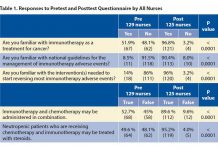By Kathleen A. Gamblin, RN, BSN, OCN
Posted: December 2017
The nursing perspective and the views of other ancillary specialties are frequently missing in the thoracic oncology literature. This deficiency needs to be addressed; the current model of healthcare delivery in the US and around the world includes an ever-expanding role for nurses, nurse practitioners, and physician assistants, and their voices need to be heard.
Writing for publication is an excellent way for nurses to share their unique knowledge and expertise on particular subjects or to share their perspective or personal story as it relates to other subjects within nursing. Writing for publication can also be used for career advancement; in some positions within nursing, there are now requirements for publishing annually. In modern society with its increasing emphasis on technology, nurses have the ability to write not only for written publications such as journals or books, but they also have the opportunity to write online content: this can include content for websites and online journals as well as professional blogs. If a nurse is interested in writing and would like to gain experience writing, many healthcare institutions offer opportunities for their nurses to publish and may supply the appropriate subject matter on which to write. These institutional opportunities include newsletters, website content, and articles requested by community publications.
For those interested in writing their own selections, the nurse must determine their subject, motivation, and audience. Do they wish to educate the reader on a new process or initiative, contribute to the body of knowledge within a certain nursing area, or take a critical look at or suggest a change in clinical practice? Once the topic is clear, the author can choose the best venue in which their publication can be shared, including in the area of thoracic oncology. For instance, in the area of thoracic oncology patient navigation, while much has been written about the navigation of breast cancer, thoracic patient navigation remains a relatively newer area. The book Oncology Nurse Navigation: Delivering Patient-Centered Care Across the Continuum, published by the Oncology Nursing Society, highlighted thoracic oncology as a distinct disease-specific site to be navigated. The portion of the chapter on thoracic navigation outlined the work and processes of the thoracic oncology nurse navigator, with special attention paid to the topics of compassion fatigue, burnout, and moral distress that can be common for the thoracic oncology nurse. This publication set the stage for further writing on the topic of thoracic oncology nurse navigation.
Another example of writing by nurses in the area of thoracic oncology is the recent book published by the Oncology Nursing Society—Oncology Nurse Navigation: Case Studies. This book features a chapter specific to a case study of thoracic oncology nurse navigation. The case study was written to show the progression of a patient through the disease process, and it establishes the role of and the importance of the thoracic oncology nurse navigator. Mindful of efforts to establish a certification process for oncology nurse navigation, the chapter concludes with evidence-based questions that can be used for future certification efforts in oncology nurse navigation.
If nurses are new to writing or have colleagues who are interested in writing, but have little experience, there are many helpful articles on the process of writing for publication. Some professional organizations offer mentorship to new writers. For instance, the Clinical Journal of Oncology Nursing has a Writing Mentorship Program, which offers a novice writer the opportunity to be paired with an experienced, published author to produce an article over a 6-month time frame. (https://cjon.ons.org/content/writing-mentorship-program).
As a published author of both journal articles and 2 edited textbooks, I can say that while the process can feel overwhelming at times, the editors and reviewers I have had the privilege to work with have been nothing but helpful and encouraging along the way. There is a deep satisfaction in seeing your name in print as an author. ✦











